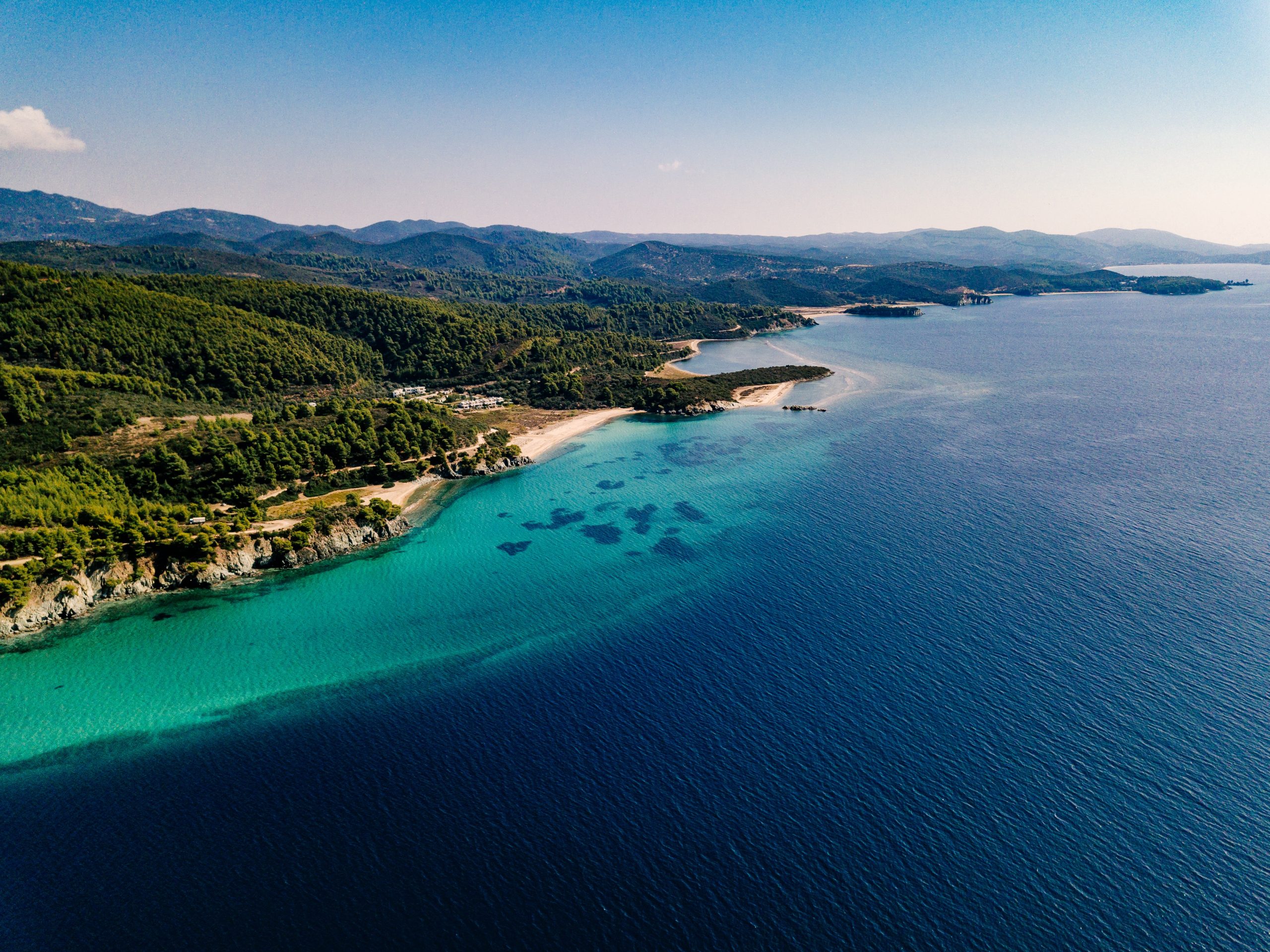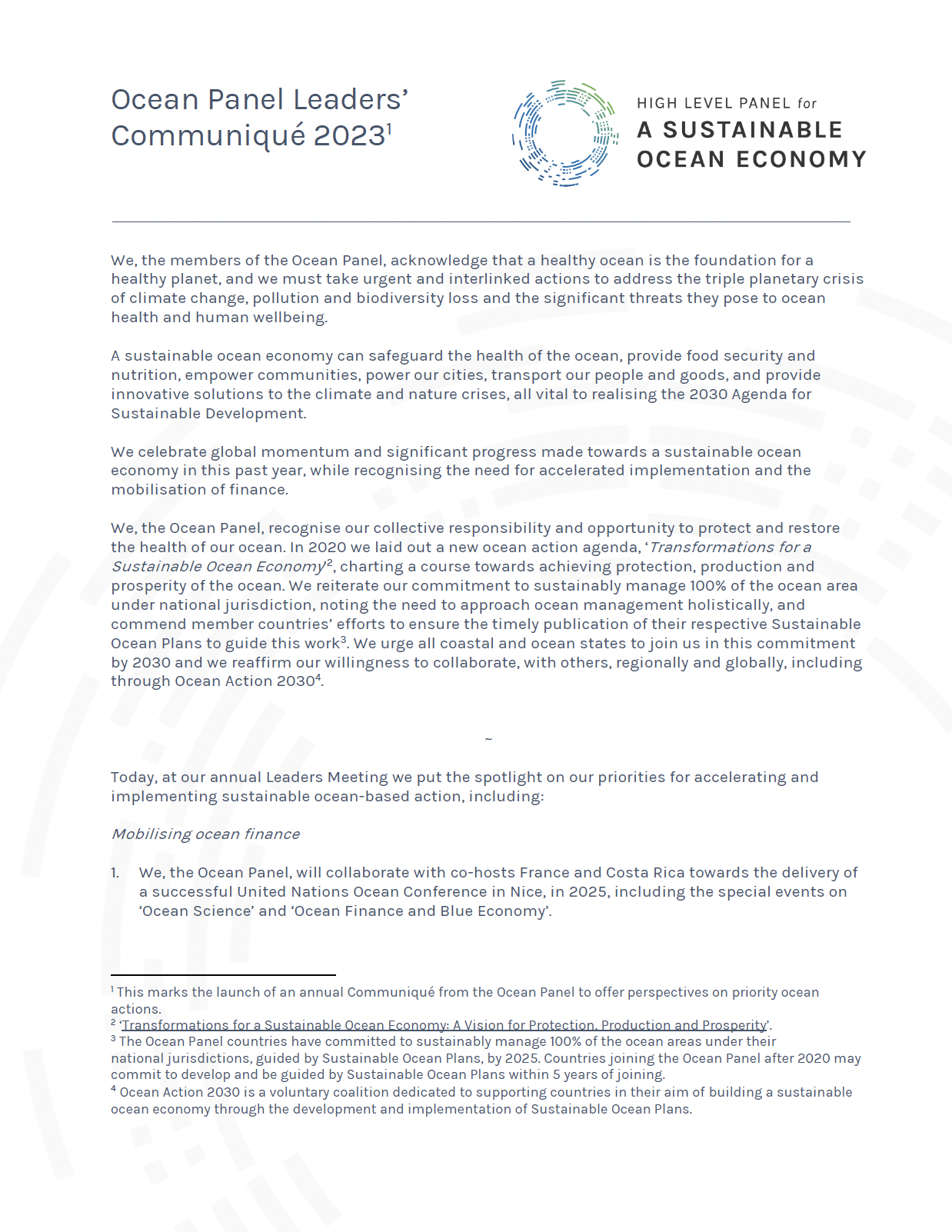We, the members of the Ocean Panel, acknowledge that a healthy ocean is the foundation for a healthy planet, and we must take urgent and interlinked actions to address the triple planetary crisis of climate change, pollution and biodiversity loss and the significant threats they pose to ocean health and human wellbeing.
A sustainable ocean economy can safeguard the health of the ocean, provide food security and nutrition, empower communities, power our cities, transport our people and goods, and provide innovative solutions to the climate and nature crises, all vital to realising the 2030 Agenda for Sustainable Development.
We celebrate global momentum and significant progress made towards a sustainable ocean economy in this past year, while recognising the need for accelerated implementation and the mobilisation of finance.
We, the Ocean Panel, recognise our collective responsibility and opportunity to protect and restore the health of our ocean. In 2020 we laid out a new ocean action agenda, ‘Transformations for a Sustainable Ocean Economy’, charting a course towards achieving protection, production and prosperity of the ocean. We reiterate our commitment to sustainably manage 100% of the ocean area under national jurisdiction, noting the need to approach ocean management holistically, and commend member countries’ efforts to ensure the timely publication of their respective Sustainable Ocean Plans to guide this work. We urge all coastal and ocean states to join us in this commitment by 2030 and we reaffirm our willingness to collaborate, with others, regionally and globally, including through Ocean Action 2030.
Today, at our annual Leaders Meeting we put the spotlight on our priorities for accelerating and implementing sustainable ocean-based action, including:
Mobilising ocean finance
1. We, the Ocean Panel, will collaborate with co-hosts France and Costa Rica towards the delivery of a successful United Nations Ocean Conference in Nice, in 2025, including the special events on ‘Ocean Science’ and ‘Ocean Finance and Blue Economy’.
2. We will also continue to engage with the Our Ocean Conferences, including the upcoming Conference in Greece in 2024, as a pathway for mobilising concrete action to protect ocean health and security.
3. We call for increased resource mobilisation from all relevant sources to enhance the implementation of sustainable ocean action, particularly for low and middle-income and developing countries. We call on Multilateral Development Banks to further strengthen ambitious ocean-based action for the benefit of climate, biodiversity and people, and to enhance the alignment and expedited mobilisation of funds to this purpose.
Accelerating ocean-based climate action
4. To limit the catastrophic impacts of climate change for people and nature – and for the health of the ocean – we state our commitment to strengthening the implementation of the Paris Agreement, including through implementation of the Glasgow Climate Pact and the Sharm el-Sheik Implementation Plan. We highlight the urgency of pursuing effective, scaled-up and ambitious actions to reduce global greenhouse gas (GHG) emissions in line with keeping a limit of 1.5˚C temperature rise within reach, while carrying out just transitions, and fostering climate resilience.
5. We celebrate that successive global gatherings have recognised the ocean as a fundamental part of the global response to climate change. Our countries will continue to actively participate in the annual Ocean and Climate Change Dialogue under the United Nations Framework Convention on Climate Change, acting with determination and request other leaders to do the same, to take forward commitments to incorporate and strengthen ocean-based measures in climate change mitigation and adaptation strategies, plans and policies, taking into account the best available science and ensuring sustainability.
6. We welcome the Ocean Panel-commissioned report, ‘The Ocean as a Solution to Climate Change: Updated Opportunities for Action’ which reiterates the potential of ocean-based climate solutions in delivering the critical emission reductions needed to limit global temperature rise to 1.5°C. Accordingly, we will accelerate domestic and collective ocean-based climate actions:
a. supporting the scaling up of ocean-based renewable energy solutions (in line with country-led net-zero pathways) in a manner that is environmentally sustainable and complements other ocean uses;
b. taking coordinated actions to incentivise and accelerate the decarbonisation of the shipping sector and supply chains, including through the Green Shipping Challenge and within the International Maritime Organization; and
c. continuing efforts to protect and restore blue carbon habitats that store and sequester carbon and improve coastal resilience, where possible accounting for these ecosystems within national GHG inventories.
Scaling up the conservation and management of marine biodiversity
7. We welcome the historic Kunming-Montreal Global Biodiversity Framework as critical for halting and reversing marine and coastal biodiversity loss, restoring degraded ecosystems, and effectively conserving and managing at least 30% of the global ocean by 2030. Those of us who are Parties to the Convention on Biological Diversity are committed to taking urgent action to meet the framework’s goals and targets and increasing our domestic efforts, updating our National Biodiversity Strategies and Action Plans accordingly by COP16, in line with national circumstances and approaches, and with consideration to the contributions, roles, rights and responsibilities of Indigenous Peoples and local communities. We highlight the valuable contribution of nature-based solutions6 towards climate, biodiversity and Sustainable Development Goals, noting Sustainable Ocean Plans as an enabling framework.
8. We celebrate the adoption of the Agreement under the United Nations Convention on the Law of the Sea (UNCLOS) on the conservation and sustainable use of marine biological diversity of areas beyond national jurisdiction as a crucial step forward to enhance ocean governance for the conservation and sustainable use of marine biological diversity of areas beyond national jurisdiction. We call for its early entry into force and implementation. We acknowledge the proposal of Chile, a member of this Panel, to host the Secretariat of the new agreement.
Advancing solutions for sustainable fisheries
9. We remain deeply concerned by the ongoing challenges to global food security and nutrition exacerbated by climate change and overfishing, including illegal, unreported and unregulated (IUU) fishing. We reiterate our steadfast commitment to deploy available solutions to combat IUU fishing through technological innovations to improve transparency and data sharing, strengthening monitoring, control and surveillance, improving flag state control and Regional Fisheries Management Organization conservation measures, and in collaboration with international partners. We emphasise the importance of effectively implementing the Agreement on Port State Measures to Prevent, Deter and Eliminate IUU Fishing and we urge coastal and ocean states who have not already done so to urgently implement this agreement.
Securing high ambition on marine pollution
10. We acknowledge the interlinkages between ocean health and human health, noting with concern the worsening of ocean pollution worldwide, and the disproportionate impacts for coastal communities, small island developing states and Indigenous populations whose survival is directly reliant on ocean ecosystems. We are ready to do our utmost, and urge all countries to implement their international obligations under UNCLOS to prevent, reduce and control pollution of the marine environment from any source, including marine plastic litter, abandoned, lost, or otherwise discarded fishing gear, microplastics and toxic chemicals.
11. We remain committed to developing an internationally legally binding instrument on plastic pollution and to support the work of the Intergovernmental Negotiating Committee that has been mandated with this responsibility. We call for the successful timely completion of an ambitious global agreement to establish common, global measures to reduce additional plastic pollution, including in the marine environment, to zero by 2040. We underline that a comprehensive lifecycle and circular economy approach is critical to end the threats posed to the environment, and the economy by plastic pollution.
As the Ocean Panel, we will continue to act with determination in line with national capacities and circumstances to accelerate a sustainable ocean economy predicated on effective protection, sustainable production and equitable prosperity. We will work through international co-operation and partnership to accelerate the effective implementation of sustainable ocean-based action, both domestically and globally. We will continue to develop and exchange knowledge and leverage the UN Decade of Ocean Science for Sustainable Development.
We urge other leaders, international organisations, industry, and civil society to join with us in this collective endeavor towards a sustainable ocean economy.
|
Anthony Albanese Prime Minister of Australia
|
William Samoei Ruto
President of Kenya |
|
Justin Trudeau Prime Minister of Canada
|
Andrés Manuel López Obrador
President of Mexico |
|
Gabriel Boric President of Chile
|
Hage G. Geingob President of Namibia |
|
Sitiveni Rabuka Prime Minister of Fiji
|
Jonas Gahr Støre
Prime Minister of Norway |
|
Nana Addo Dankwa Akufo-Addo President of Ghana
|
Surangel Whipps, Jr.
President of Palau |
|
Joko Widodo President of Indonesia
|
António Costa
Prime Minister of Portugal |
|
Andrew Michael Holness Prime Minister of Jamaica
|
Rishi Sunak
Prime Minister of United Kingdom |
|
Fumio Kishida Prime Minister of Japan
|
Joseph R. Biden, Jr.
President of the United States of America |


 Previous
Previous



